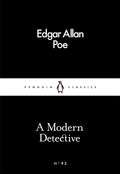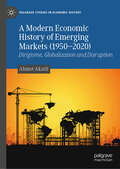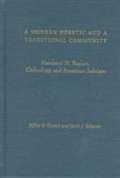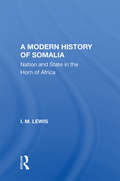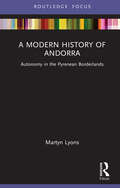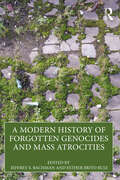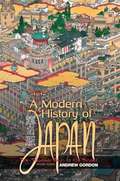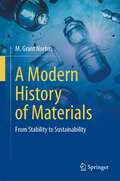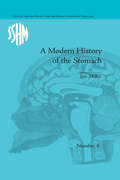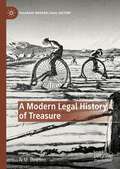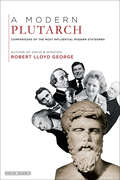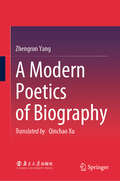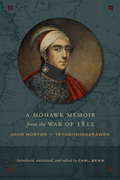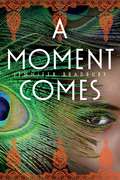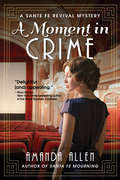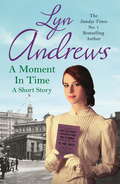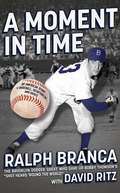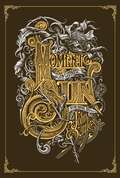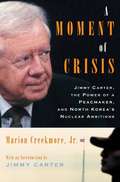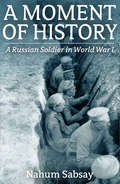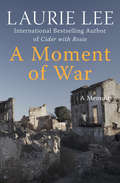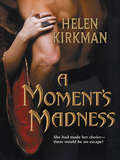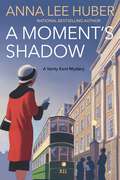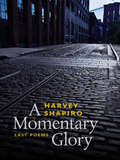- Table View
- List View
A Modern Detective (Penguin Little Black Classics)
by Edgar Allan PoeHe is fond of enigmas, of conundrums, hieroglyphics; exhibiting in his solutions of each a degree of acumen which appears to the ordinary apprehension praeternatural.
A Modern Economic History of Emerging Markets: Dirigisme, Globalization and Disruption (Palgrave Studies in Economic History)
by Ahmet AkarliThis book offers a comprehensive economic history of emerging market economies post-WWII and identifies a complex web of sustainability problems that face the EMEs going forward. It seeks to present a truly global perspective on the development of EMEs and the long-term trends that have brought EMEs to a critical economic juncture. The first section of the book charts how EMEs became tightly integrated into the global economy at rapid pace, analysing economic achievements as well as imbalances and sustainability issues that have been generated over time. It considers how EMEs have withstood episodes of complex structural transitions and financial shocks, and offers comparative perspectives on patterns of dispersion within the EME landscape from the end of WWII to the present. The second part of the book seeks to understand how EMEs might cope with the volatility brought about by a new ‘age of disruption’ defined by major structural challenges to the neo-liberal economic order. It considers which EMEs are best positioned to respond to issues of economic inequality, financial excess, technological disruption and climate change, what a global historical understanding of the EMEs can offer to policymakers, and the impact on the EME investment landscape. This book will be of interest to a broad audience including researchers of economic history and political economy, as well as policymakers, investment professionals, and the general reader interested in global economic development.
A Modern Heretic and a Traditional Community: Mordecai M. Kaplan, Orthodoxy, and American Judaism
by Jeffrey S. Gurock Jacob J. SchacterEncompasses more than previous autobiographies of Kaplan (1881-1983) by considering at length the community he came from, lived in, fought with, and left behind. Follows him from his early days as a member in good standing in the New York Orthodox Jewish community, through his private estrangement and public divorce from Orthodoxy, to his founding of Reconstructionism and many decades as the movement's leader. Queries whether a religious group can learn anything from one of its members who has rejected its most fundamental beliefs. Annotation c. by Book News, Inc., Portland, Or.
A Modern History Of Somalia: Nation And State In The Horn Of Africa, Revised, Updated, And Expanded Edition
by I.M. LewisThis latest edition of A Modern History of the Somali brings I. M. Lewis's definitive history up to date and shows the amazing continuity of Somali forms of social organization. Lewis's history portrays the ingeniousness with which the Somali way of life has been adapted to all forms of modernity. "By far the most penetrating of the works on Somal
A Modern History of Andorra: Autonomy in the Pyrenean Borderlands (Routledge Studies in Modern European History)
by Martyn LyonsThis book examines the fascinating survival of Andorra, one of Europe's micro-states nestled between France and Spain. Despite its medieval institutional framework, Andorra endured into the late 20th century without an army, police, currency, or customs barriers. The book uncovers how Andorra skilfully exploited its strategic position between two powerful neighbours, using its unique dual sovereignty to navigate the pressures of the modern nation-state era and secure its survival.Exploring a range of historical events, the book delves into the misconceptions found in European travel writing about Andorra, the eccentric 1934 episode when Boris Skossyreff crowned himself King, and the country’s pivotal role as an escape route during World War II. It also highlights Andorra's transformation into a prosperous modern society, built on tourism and commerce. The narrative provides a detailed account of how Andorra evolved from a medieval holdover to a thriving micro-state in the contemporary world.A valuable resource for students of modern French and Spanish history, this book will also appeal to specialists in border studies and anyone interested in the endurance of Europe’s micro-states.
A Modern History of Forgotten Genocides and Mass Atrocities
by Jeffrey S. Bachman Esther Brito RuizThis is the first textbook of its kind to amass cases of genocide and other mass atrocities across the nineteenth, twentieth, and twenty-first centuries that have largely been pushed to the periphery of Genocide Studies or “forgotten” altogether.Divided into four thematic sections – Genocide and Imperialism; War and Genocide; State Repression, Military Dictatorships, and Genocide; and Human-Caused Famine, Attrition, and Genocide – A Modern History of Forgotten Genocides and Mass Atrocities covers five continents, including case studies from Biafra, Yemen, Argentina, Russia, China, and Bengal. They range from the French conquest of Algeria in the mid-nineteenth century to the Yazidi genocide perpetrated by the Islamic State in Iraq and Syria between 2014 and 2017, and show that at times of rising authoritarianism, military conquest, and weaponization of hunger, lines between what is war and what is genocide are increasingly blurred. By including genocides and mass atrocities that are often overlooked, this volume is crucial to the ongoing debates about whether “this atrocity or that one” amounts to genocide.By including key points, events, terms, and critical questions throughout, this is the ideal textbook for undergraduate students who study genocide, mass atrocities, and human rights across the globe.
A Modern History of Japan: From Tokugawa Times to the Present (2nd edition)
by Andrew GordonGordon (history and Japanese studies, Harvard U.) begins his history in about 1800, looking at how particularly the industrial revolution had changed the balance of global economic and military power, and the pressures that caused the Tokugawa military lords to fall from power. Annotation (c)2003 Book News, Inc., Portland, OR (booknews.com)
A Modern History of Materials: From Stability to Sustainability
by M. Grant NortonWhat could the ancient Egyptians tell us about 3D printing? How can we make lithium-ion batteries greener and more sustainable? Which materials will form the heart of future quantum computers?Plastic films, glass optical fibers, silicon crystals, and more — this book is about the history of the materials that have rapidly transformed our society over the last century and their role in the major global challenges of the future. From metal alloys ushering in a new age of industry to advanced materials laying the atomic brickwork of the Digital Revolution, the book examines the societal impact of the modern materials revolution through the twin lenses of stability and sustainability.Why aren’t maglev trains mainstream? Whatever happened to graphene and carbon nanotubes? The book also looks at the unmet promises of some of the most exciting — and hyped — technologies in recent decades — superconductivity and nanotechnology. The final chapter reviews our history of materials usage, the increasing demand for many critical raw materials, and addresses the upcoming new challenges for creating a circular economy based on reusing and recycling materials.
A Modern History of the Stomach: Gastric Illness, Medicine and British Society, 1800–1950 (Studies for the Society for the Social History of Medicine #4)
by Ian MillerThis is the first exploration of the relationship between the abdomen and British society between 1800 and 1950. Miller demonstrates how the framework of ideas established in medicine related to gastric illness often reflected wider social issues including industrialization and the impact of wartime anxiety upon the inner body.
A Modern Legal History of Treasure (Palgrave Modern Legal History)
by N.M. DawsonThis book examines treasure law and practice from the rise of the new science of archaeology in the early Victorian period to the present day. Drawing on largely-unexamined state records and other archives, the book covers several legal jurisdictions: England and Wales, Scotland, Ireland pre- and post-independence, and post-partition Northern Ireland. From the Mold gold cape (1833) to the Broighter hoard (1896), from Sutton Hoo (1939) to the Galloway hoard (2014), the law of treasure trove, and the Treasure Act 1996, are considered through the prism of notable archaeological discoveries, and from the perspectives of finders, landowners, archaeologists, museum professionals, collectors, the state, and the public. Literally and metaphorically, treasure law is revealed as a ground-breaking chapter in the history of the legal protection of cultural property and cultural heritage in Britain and Ireland.
A Modern Plutarch: Comparisons of the Most Influential Modern Statesmen
by Robert Lloyd GeorgeInspired by the Ancient Greek biographer, this volume offers comparative assessments of important leaders from American and British history. One of the most significant and enduring texts of Ancient Greece is Plutarch&’s Lives of the Noble Greeks and Romans. In it, the &“Father of Biography&” paired off the most notable and influential figures of the classical world, placing their lives and legacies next to each other, allowing the comparisons and juxtapositions to reveal new truths about these famous men. He compared Demosthenes with Cicero, Alexander the Great with Julius Caesar; the result was an intellectual masterpiece still referred to by historians today. In A Modern Plutarch, Robert Lloyd George applies this model of biography to the most influential statesmen and stateswomen of American and British history. Lloyd George compares figures such as Edmund Burke, a prophet of modern conservatism, and Thomas Paine, a champion for the common man. He juxtaposes Winston Churchill and Abraham Lincoln, two of the greatest wartime leaders of the past 200 years, and Margaret Thatcher and Ronald Reagan, the first divisive, the latter popular. In doing so, he draws parallels between their lives and philosophies, while revealing the traits that made them unique. An essential primer on leadership and an inspiring account of exceptional lives, A Modern Plutarch offers remarkable insight into some of the greatest minds of the modern era.
A Modern Poetics of Biography
by Zhengrun YangThis book provides a comprehensive study of biography, to summarize the standard forms as well as a range of peripheral and expanded forms of auto/biography. Discussion and analyses to be done at three levels, namely ontology, typology, and writing. It is drawn from local and international theories in biography, in addition to related disciplines, in particular for those of the twentieth century, and summarizing the experiences of the writing of classics in both Chinese and Western biographical history, the study establishes a theoretical system of biography. This book can serve as a useful reference for postgraduate students and professional readers who are interested in biographical research.
A Mohawk Memoir from the War of 1812: John Norton - Teyoninhokarawen
by John Norton TeyoninkarawenA Mohawk Memoir from the War of 1812 presents the story of John Norton, or Teyoninhokarawen, an important war chief and political figure among the Grand River Haudenosaunee (or Iroquois) in Upper Canada. Norton saw more action during the conflict than almost anyone else, being present at the fall of Detroit, the capture of Fort Niagara, the battles of Queenston Heights, Fort George, Stoney Creek, Chippawa, and Lundy’s Lane, the blockades of Fort George and Fort Erie, as well as a large number of skirmishes and front-line patrols. His memoir describes the fighting, the stresses suffered by indigenous peoples, and the complex relationships between the Haudenosaunee and both their British allies and other First Nations communities. Norton’s words, written in 1815 and 1816, provide nearly one-third of the book’s content, with the remainder consisting of Carl Benn’s introductions and annotations, which enable readers to understand Norton’s fascinating autobiography within its historical contexts. With the assistance of modern scholarship, A Mohawk Memoir presents an exceptional opportunity to explore the War of 1812 and native-newcomer issues through Teyoninhokarawen’s Mohawk perspectives from a period that produced few indigenous autobiographies, of which Norton’s is the most extensive, engaging, and reliable.
A Moment Comes
by Jennifer BradburyBefore India was divided, three teens, each from wildly different backgrounds, cross paths. And then, in one moment, their futures become irrevocably intertwined.Tariq. Anupreet. Margaret. As different as their Muslim, Sikh, and British names. But in one moment, their futures become entirely dependent on one another's. While the rest of India anxiously awaits the upcoming partition that will divide the country into two separate religious states, eighteen-year-old Tariq focuses on his own goal: to study at Oxford. But for a Muslim born and raised in India, there is no obvious path to England--until Tariq is offered a job translating for one of the British cartographers stationed in India, tasked with establishing the new borders. Margaret, the cartographer's daughter, has only just arrived in India. But already she has discovered it to be hot, loud, and dull. She can't go anywhere alone for fear of the riots and violence. Eager for a distraction, she finds one in Tariq. But it's Anupreet, another member of the staff, who has truly captured Tariq's eye. She's strikingly beautiful--but she's a Sikh, so not someone Tariq should even be caught looking at. And yet he's compelled to... Against the backdrop of the nearly forgotten history of the partition of India, Jennifer Bradbury, as if with strands of silk, weaves together the heart-pounding tale of three teenagers on wildly different paths, on the verge of changing each other's lives forever.
A Moment in Crime (A Santa Fe Revival Mystery #2)
by Amanda AllenFans of Rhys Bowen will be abuzz over Amanda Allen’s second installment in her bold Santa Fe Revival mysteries.The on-set murder of a famous Jazz Age film director unearths a hornet’s nest of passion, duplicity, naked ambition, and bitter revenge.The golden age of cinema is dawning, and Santa Fe is in the grip of movie fever when director Luther Bishop arrives for the filming of his new cowboy flick. Maddie Vaughn-Alwin’s cousin Gwen Astor is in town with a bit part in the movie—but Gwen finds herself caught in a whirlwind of mischief before shooting even begins. But the plot only thickens when the detestable director is found hanging in his office. When it comes to light that Gwen was having a torrid affair with Luther, she gets pegged as the prime suspect, much to Maddie’s dismay. But Maddie, quick on her feet with ever the keen eye knows that Luther had his fair share of enemies, and there’s no shortage of contenders. Luther’s widowed wife Bridget finally assumes her late husband’s most-coveted director’s chair, head of wardrobe Lorelei Fontaine is bitterly denied a role by Luther she was once promised, and original leading man Harry Kelly was summarily fired by Luther just upon arriving at Santa Fe. Desperate to prove Gwen’s innocence, Maddie begins an investigation, but every clue reveals another motive—and could point to another murder—in A Moment in Crime, the second engaging whodunit in Amanda Allen’s enchanting Santa Fe Revival mysteries.
A Moment in Time: A Short Story
by Lyn AndrewsA heartwarming short story of turn-of-the-century Liverpool from the bestselling author of THE HOUSE ON LONELY STREET, perfect for readers of Dilly Court and Katie Flynn.Ellen Holt has grown up in the heart of Liverpool's slums. Each day brings worry and struggle for her mam and da and Ellen works hard as a factory girl to help her family. Together, they get by. She has never imagined any other existence until one night she joins a gathering of suffragettes. Suddenly anything seems possible. But she's soon to discover how much courage it takes to fight for better. And, just when all seems lost, Eddie Shaw walks into her world...Includes the first chapter of Lyn's captivating new novel FROM LIVERPOOL WITH LOVE.
A Moment in Time: A Short Story
by Lyn AndrewsA heartwarming short story of turn-of-the-century Liverpool from the bestselling author of THE HOUSE ON LONELY STREET, perfect for readers of Dilly Court and Katie Flynn.Ellen Holt has grown up in the heart of Liverpool's slums. Each day brings worry and struggle for her mam and da and Ellen works hard as a factory girl to help her family. Together, they get by. She has never imagined any other existence until one night she joins a gathering of suffragettes. Suddenly anything seems possible. But she's soon to discover how much courage it takes to fight for better. And, just when all seems lost, Eddie Shaw walks into her world...Includes the first chapter of Lyn's captivating new novel FROM LIVERPOOL WITH LOVE.
A Moment in Time: An American Story of Baseball, Heartbreak, and Grace
by David Ritz Ralph BrancaA first-hand account of the golden era of baseball from Jackie Robinson's friend, former teammate and featured player in the 2013 biopic "42."Ralph Branca is best known for throwing the pitch that resulted in Bobby Thomson's "Shot Heard 'Round the World," the historic home run that capped an incredible comeback and won the pennant for the New York Giants in 1951. Branca was on the losing end of what many consider to be baseball's most thrilling moment, but that notoriety belies a profoundly successful life and career. A Moment in Time details the remarkable story of a man who could have been destroyed by a supreme professional embarrassment--but wasn't. Branca came up as a young phenom, playing for the Brooklyn Dodgers during their heyday. He was a staple of the Dodgers' teams in the late 1940s, dominating the National League. It's no stretch to say that New York baseball was the center of the sporting universe and that the players were part of the fabric of the neighborhoods, of the city itself. A Moment in Time offers a rare first-person perspective on the golden era of baseball, opening a window on an amazing world populated by legendary characters such as Jackie Robinson, Pee Wee Reese, Gil Hodges, Leo Durocher, Branch Rickey, and Walter O'Malley. Ralph Branca sits us down and tells us an entertaining, deeply inspiring, classic baseball tale. *** I LOVE BASEBALL. "Baseball is the reason I am writing this book, the reason I've led a life worth reexamining and dissecting. Baseball is the passion that carried me from childhood to manhood. It is how I fought my way from the working class to the middle class. Were it not for baseball, I would not have met Ann, my wife, the mother of our daughters, and my dearest friend for the past sixty years. Baseball has excited my mind, stirred my soul, and brought out the best in me. I look at baseball deeply. Most of us whose lives have been defined by baseball do. Of course, it's principally a sport--a beautiful sport based on a poetic geometry. It is a game played outside of time. You play it not until the clock runs out, but until there is a clear winner. That takes as long as it takes. It is a pastoral game usually set inside a city. You play in a pasture--an urban pasture--where an expanse of grass calls you to the competition. Of course, you can also play on the dirt field of a farm, a sandlot, or a concrete street. Wherever you play, though, time is suspended. Like millions of other kids, I lost track of time whenever I played--playing through breakfast, lunch, dinner; playing until the very last rays of daylight disappeared; playing under the glow of a street lamp or a full moon; playing with the hope that the game would never stop and that real time--any time but baseball time--would never resume. The dream was to turn life into a baseball game." --from the Introduction
A Moment in the Sun
by John SaylesIt's 1897. Gold has been discovered in the Yukon. New York is under the sway of Hearst and Pulitzer. And in a few months, an American battleship will explode in a Cuban harbor, plunging the U.S. into war. Spanning five years and half a dozen countries, this is the unforgettable story of that extraordinary moment: the turn of the twentieth century, as seen by one of the greatest storytellers of our time.Shot through with a lyrical intensity and stunning detail that recall Doctorow and Deadwood both, A Moment in the Sun takes the whole era in its sights-from the white-racist coup in Wilmington, North Carolina to the bloody dawn of U.S. interventionism in the Philippines. Beginning with Hod Brackenridge searching for his fortune in the North, and hurtling forward on the voices of a breathtaking range of men and women-Royal Scott, an African American infantryman whose life outside the military has been destroyed; Diosdado Concepcíon, a Filipino insurgent fighting against his country's new colonizers; and more than a dozen others, Mark Twain and President McKinley's assassin among them-this is a story as big as its subject: history rediscovered through the lives of the people who made it happen.
A Moment of Crisis: Jimmy Carter, the Power of a Peacemaker, and North Korea's Nuclear Ambitions
by Marion CreekmoreIn A Moment of Crisis, Marion V. Creekmore, Jr. tells the story of Jimmy Carter's dramatic intervention in the 1994 North Korean nuclear crisis and shows how Carter prevented what he had determined was an almost certain war. Writing with the cooperation of President Carter, and drawing on a large amount of primary source material that has never been used before, Creekmore, who accompanied Carter into North Korea, delivers a gripping narrative of the former President on one of his most remarkable missions, a clear-eyed investigation into the controversies and successes of the mission and others like it, and an illuminating look at how to best handle North Korea and other "rogue regimes." This is essential reading for anyone interested in diplomacy of the highest order, how Jimmy Carter has accomplished the extraordinary achievements of his post-Presidency, the circumstances that can lead to war, and the resolve that it takes to avoid it.
A Moment of History A Russian Soldier in World War I
by Nahum SabsayA Moment of History, first published in 1960, is Nahum Sabsay's dramatic account of his years as a front-line Russian soldier fighting the Germans and Austrians. Especially memorable is his description of the an informal truce where the Russian and Austrian troops, separated by a No-man's land, sang and danced together, followed the next day by intense artillery barrages on each side. The book also depicts the fall of Czarist Russia and the fight against the Communist Red Army. Choosing to flee this chaos, author Sabsay would travel eastward across Siberia, arriving in the U.S. In 1918, he would go on to study mining engineering at Harvard and moved to California where he worked as a tool and die maker while perfecting his English and writing. Sabsay died in 1965.
A Moment of War: A Memoir (The Autobiographical Trilogy #3)
by Laurie LeeA memoir of the Spanish Civil War with &“the plainness of Orwell but the metaphorical soaring of a poem . . . An extraordinary book&” (The New York Times Book Review).In December 1937 I crossed the Pyrenees from France—two days on foot through the snow. I don&’t know why I chose December; it was just one of a number of idiocies I committed at the time. Such was Laurie Lee&’s entry into the Spanish Civil War. Six months after the Nationalist uprising forced him to leave the country he had grown to love, he returned to offer his life for the Republican cause. It seemed as simple as knocking on a farmhouse door in the middle of the night and declaring himself ready to fight. It would not be the last time he was almost executed for being a spy. In that bitter winter in a divided Spain, Lee&’s youthful idealism came face to face with the reality of war. The International Brigade he sought to join was not a gallant fighting force, but a collection of misfits without proper leadership or purpose. Boredom and bad food and false alarms were as much a part of the experience of war as actual battle. And when the decisive moment finally came—the moment of him or the enemy—it left Lee feeling the very opposite of heroic. The final volume in Laurie Lee&’s acclaimed autobiographical trilogy—preceded by Cider with Rosie and As I Walked Out One Midsummer Morning—is a clear-eyed and vital snapshot of a young man, and a proud nation, at a historic crossroads.
A Moment's Madness
by Helen KirkmanTheir Passion Could Not Be Denied--But Could Their Love Transcend All That Had Gone Before?Only a moment. . . And a decision born out of desperation had sealed Sigrid's fate. With the raiding English army at her heels, the Viking widow had thrown herself on the mercy of a fierce Saxon warrior. Perhaps it was madness that had driven her into the arms of her enemy, but his look had promised shelter from the carnage surrounding them. She had never wanted a man in her life. She remembered how much reason they had to hate each other. And now she had just done the most dangerous, stupid thing imaginable. . .
A Moment's Shadow (A Verity Kent Mystery)
by Anna Lee HuberViolence, reprisal, and intrigue abound in post-World War I Ireland as the bloody conflict between the Irish Republican Army and the British authorities continues to escalate. But former British Intelligence agent Verity Kent must deal with a more immediate concern—the possession of poisonous gas by a ruthless adversary . . .August 1920, Dublin, Ireland: A fraught task keeps Verity and her husband Sidney in the country after their initial clandestine mission has been completed: the traitor Lord Ardmore is scheming to employ the deadly phosgene gas he&’s stolen for some terrifying purpose, and the couple will need both the Crown Forces and the rebels&’ help to thwart him. As they pursue their quarry, they are drawn into a case involving a series of cunning and brazen jewel thefts. Many believe it is the work of the Irish rebels, seeking to fund their revolution, but when Verity and Sidney are also approached by Michael Collins and the IRA to unmask the thief, they suspect he may instead be an opportunist using the political unrest as a cover for his crimes. As the thief continues to pull ever more risky jobs—including targeting Verity and Sidney&’s friends—the couple receive new intelligence that the gas they seek may be intended for a crowded event, one that the entire world will be attuned to. They must stop Lord Ardmore at all costs—or the consequences will be devastating . . .
A Momentary Glory: Last Poems (Wesleyan Poetry Series)
by Harvey ShapiroThe passionate testament of a brilliant poet in the face of age, illness, and mortality The distinguished poet Harvey Shapiro passed away on January 7, 2013. The poems in this book, many of them previously unpublished and discovered only after his death, are a great gift, and the final confirmation of his extraordinary talent. Edited by Shapiro's literary executor, the poet and critic Norman Finkelstein, these last poems bear an unprecedented gravitas, and yet they are as supple, jazzy, and edgy as Shapiro's earlier work. All the themes for which he is known are beautifully represented here. There are poems of his experiences in World War II, the erotic life, and of daily moments in Brooklyn and Manhattan, all in search of a worldly wisdom and grace that the poet calls "a momentary glory." As Shapiro tells us, the poem "Is an Egyptian / ship of the dead, / everything required / for life stored / in its hold." The book includes an introduction by the editor.
